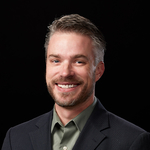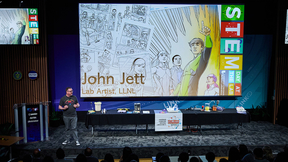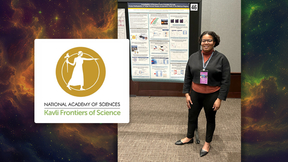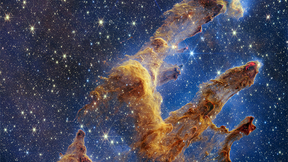LLNL experimental physicist Alex Zylstra awarded 2023 Fabre Prize
 (Download Image)
(Download Image)
Alex Zylstra is honored with the Edouard Fabre prize for his exceptional contributions to the physics of laser-driven inertial confinement fusion (ICF) and laser-produced plasmas. Photo by Brandi Caskey.
Lawrence Livermore National Laboratory (LLNL) physicist Alex Zylstra has been awarded the 2023 Edouard Fabre Prize for his experimental leadership of the milestone “Hybrid-E” campaign that achieved fusion ignition at the National Ignition Facility (NIF).
The inertial confinement fusion (ICF) campaign used increased laser energy to compress deuterium and tritium (DT) fuel, resulting in the first laboratory demonstrations of a burning plasma, ignition and target gain greater than one.
Named for one of the founders of ICF in Europe, the Edouard Fabre Prize is awarded to active, mid-career researchers within 15 years of their doctoral degree. Zylstra was recognized for his “exceptional contributions to the physics of laser-driven ICF and laser-produced plasmas.”
The award, sponsored by the European Cooperation in Science and Technology Network for Inertial Confinement Fusion, was presented at the International Conference on Inertial Fusion Sciences and Applications this week in Denver, Colorado. David Turnbull, laser-plasma interactions group leader at the University of Rochester’s Laboratory for Laser Energetics, will also be honored.
“It's been a remarkable opportunity for me to be at LLNL and have access to tremendous resources to pursue this groundbreaking work at NIF,” Zylstra said. “It's been a unique privilege to be part of research that pushes the boundaries of what's possible in the field of fusion research.”
Zylstra and his team led improvements in recent years in the scientific design and required technologies to enable increased performance of NIF experiments through the burning plasma and ignition regimes.
The Hybrid-E ICF implosion design increased hohlraum energy efficiency and used larger radii capsules to enhance the energy coupled to the DT fuel inside the capsule. The campaign used cross-beam energy transfer to control the implosion symmetry by operating NIF’s 192 laser beams at slightly different wavelengths. It also used an experimentally based model of “low-mode” asymmetry that describes how an implosion responds to hohlraum, capsule, and laser design parameters.
Those advances culminated with LLNL’s achievement of fusion ignition for the first time on Dec. 5, 2022, at NIF.
“While it’s been a team effort, much of the success can be attributed to Alex’s deep understanding of the physics principles, common-sense judgement, and his tenacity of sticking with it amidst challenges,” said Omar Hurricane, chief scientist of the LLNL ICF program.
In addition to the Hybrid-E success, Zylstra has done considerable technical work in the areas of ICF and high energy density (HED) physics, including nuclear astrophysics, charged-particle transport and the development of other novel inertial fusion designs. He also has led hot-spot and ignition metrics analysis of NIF experiments.
“Being recognized by the ICF community holds special significance, as the fusion ignition achievement at NIF is a culmination of decades of work within this community,” Zylstra said. “It underscores the importance of collaborative efforts and the progress we've together made to advance the frontiers of ICF and HED physics science.”
Zylstra received his Ph.D. in physics at the Massachusetts Institute of Technology in 2015 and subsequently joined Los Alamos National Laboratory as a Reines Distinguished Postdoctoral Fellow. He joined LLNL in 2018 as an ICF/HED experimentalist. His work has been recognized by a DOE Early Career award in 2018 and the LLNL Early Career award in 2021.
Zylstra joins a distinguished list of past Fabre Prize laureates, including LLNL's Pierre Michel (2015) and Félicie Albert (2017).
Contact
 Paul Rhien
Paul Rhien
[email protected]
(925) 422-4206
Related Links
National Ignition FacilityDavid Turnbull
Fusion Ignition Achievement
Pierre Michel
Félicie Albert
Tags
Lasers and Optical S&TLasers
National Ignition Facility and Photon Science
Science
Featured Articles







